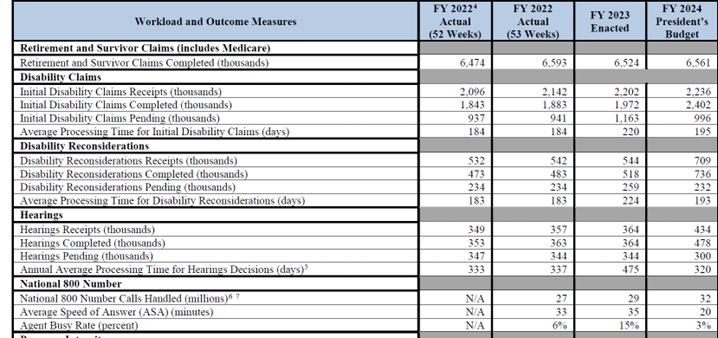
Social Security Administration Proposes FY2024 Budget Request to Congress
March 29, 2023
On March 9, the Biden Administration released its Fiscal Year (FY) 2024 budget proposals to Congress. SSA’s
“…FY 2024 budget request is $15.5 billion, a nearly $1.4 billion or 10 percent increase from the FY 2023 enacted level. This increase is necessary to improve services at our field offices, State DDSs, and teleservice centers for retirees, people with disabilities, and their families. The Budget also assists people facing barriers in accessing our services through expanding online tools and improving National 800 Number service, and by adding staff to reduce the wait for a disability decision.” Social Security Administration, Justification of Estimates for Appropriations Committees, Page 8
SSA received a $785 million increase over the FY2022 actual funding level in the FY 2023 full year appropriation that was enacted at the end of last calendar year. SSA indicated that the increase received last year was not even enough to prevent service deterioration, let alone to decrease backlogs or wait times for disability determinations, reconsiderations, hearings, or 800 number calls. As you can see from the chart below, SSA predicts a significant deterioration in all of those metrics in FY2023, despite the increase in this FY year’s budget. SSA requested the same increase last year and, as is outlined in this dear colleague letter, indicated it is what is needed to improve customer service. SSA indicated in this letter that it would need at least $800 last year just to maintain customer service at FY2022 levels in FY2023.

NOSSCR has long advocated for adequate funding for SSA and also advocates for SSA to ensure it is taking every step it can to use the funding it has in the most efficient and effective ways.
Presidential budget requests often include legislative changes that it is working with Congress on getting implemented into law. This years budget did not contain any specific proposals but did indicate that SSA is looking forward to legislating on Social Security and SSI. The following language about potential legislative priorities was included in the budget proposal:
Protects the Benefits that Americans Have Earned
The Administration is committed to protecting and strengthening Social Security and opposes any attempt to cut Social Security benefits. The Administration looks forward to working with the Congress to strengthen Social Security by ensuring high-income individuals pay their fair share. In addition, the Administration looks forward to improving the Supplemental Security Income program to help low-income older Americans and people with disabilities afford their basic needs.
Provides National, Comprehensive Paid Family and Medical Leave
The vast majority of America’s workers do not have access to paid family leave, including three out of four private sector workers. Among the lowest-paid workers, who are predominantly women and workers of color, 92 percent have no access to paid family leave through their employers. As many as one in five retirees leave the workforce earlier than planned to care for an ill family member, which negatively impacts families as well as the Nation’s labor supply and productivity. The Budget proposes to establish a national, comprehensive paid family and medical leave program administered by SSA. The program would: provide workers with progressive, partial wage replacement to take time off for family and medical reasons; include robust administrative funding; and use an inclusive family definition. The Budget would provide up to 12 weeks of leave to allow eligible workers to take time off to: care for and bond with a new child; care for a seriously ill loved one; heal from their own serious illness; address circumstances arising from a loved one’s military deployment; or find safety from domestic violence, sexual assault, or stalking. The Budget would also provide up to three days to grieve the death of a loved one. The Administration looks forward to continuing to work with the Congress to make this critical investment and strengthen America’s economy.
It is unlikely that Congress will fund SSA at the level it has requested. Republicans, who are in control of the House, have indicated cutting spending is a priority and are unlikely to agree to funding SSA at the level requested in the President’s proposal. It is important to remember that the President’s funding request is simply that: a request that is almost never enacted at the level requested. But it does set the parameters of the debate and becomes a starting point for Congressional discussion.


